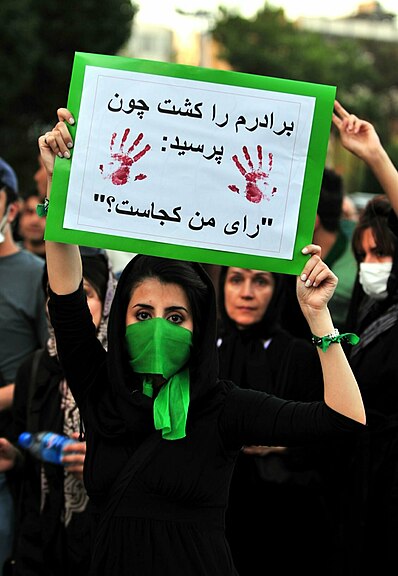
[digg-reddit-me]Oh, Michael Ledeen, to whom every Democrat is Chamberlain and every Republican is Churchill! And every crackpot is Adolf Hitler. Reading Obama’s statement to Iran on the anniversary of the takeover of the US embassy – which is celebrated in Iran, Ledeen concludes that Obama is merely “mewling and whining, asking for the Iranian regime to make nice,” in “full Carter/Chamberlain mode.” He links to a report calling Obama’s remarks: “Another respectful statement – if wrapped around a threat.” Yet, Ledeen quotes one section – in which Obama explains all of the things we are doing (and not doing) with regards to Iran that the Green Wave supports. Ledeen objects that our foreign policy regarding Iran has mainly been supported by the Green Wave. And he neglects to quote this passage:
Iran must choose. We have heard for thirty years what the Iranian government is against; the question, now, is what kind of future it is for. The American people have great respect for the people of Iran and their rich history. The world continues to bear witness to their powerful calls for justice, and their courageous pursuit of universal rights. It is time for the Iranian government to decide whether it wants to focus on the past, or whether it will make the choices that will open the door to greater opportunity, prosperity, and justice for its people.
Reading Obama expressing support for the Iranian people, bearing witness to the Green Wave, and making a veiled threat against the regime, Ledeen concludes:
A sad day to be an American, don’t you think? As Churchill said of Chamberlain, we can say of Obama: You had a choice between war and dishonor. You chose dishonor, and you will have war.
In fact, he’s already got it. It always happens when you become an accomplice to evil.
Yet I am not sure what it is Ledeen wants us to do. He has written consistently and often about the need to change the Iranian regime – but is he really so naïve as to believe that a few symbolic gestures by Obama are all that it would take to cause the downfall of that regime? Does Ledeen believe that some money spent on democracy promotion will destroy it? Does he give any credence to the idea that such funding would undermine these organizations? What does he make of the fact that many of these organizations rejected the funds the Bush administration set aside for precisely this purpose? Reading Obama challenging the Iranian regime, Ledeen suggests it is merely “mewling” and that war is inevitable – has he reversed positions and now suggest we invade or bomb the country – in support of the people?
Ledeen’s remarks on Iran clearly demonstrate one of the fallacies of the neoconservative worldview. It is a worldview that did not learn the lesson of Hungary in 1957 where the CIA radio stations promised military support if the citizens rose up, which the citizens did only to be slaughtered. Nor the lesson of the First Gulf War, where George H. W. Bush called on the Shiia to rise up against Saddam, and then stood aside as Saddam made peace and crushed as American forces watched. Nor the lesson of Georgia, where neoconservatives declared, “We are all Georgians!” and proceeded to do nothing as Russian tanks overran the country. Neoconservative foreign policy has consisted of writing “rhetorical checks” that they have “no intention (or ability) to cash,” or more graphically “hip-shooting onanism.”
In every instance, America took the “right” rhetorical position at first but was unwilling to back it up by sacrificing American lives. If neoconservatives truly believe we must have regime change, then they should make the case for why this fight is worth Americans dying, instead of making easy references to Hitler and Chamberlain.
As a people, Americans support the Green Wave. And as a government, the Obama administration should put what pressure it can for the principles it believes in: including the right to self-determination. But American troops and money can’t buy Iranian self-determination – only the Iranian people themselves can:
This is not about the United States and the West; this is about the people of Iran, and the future that they – and only they – will choose.
[Image licensed under Creative Commons.]

